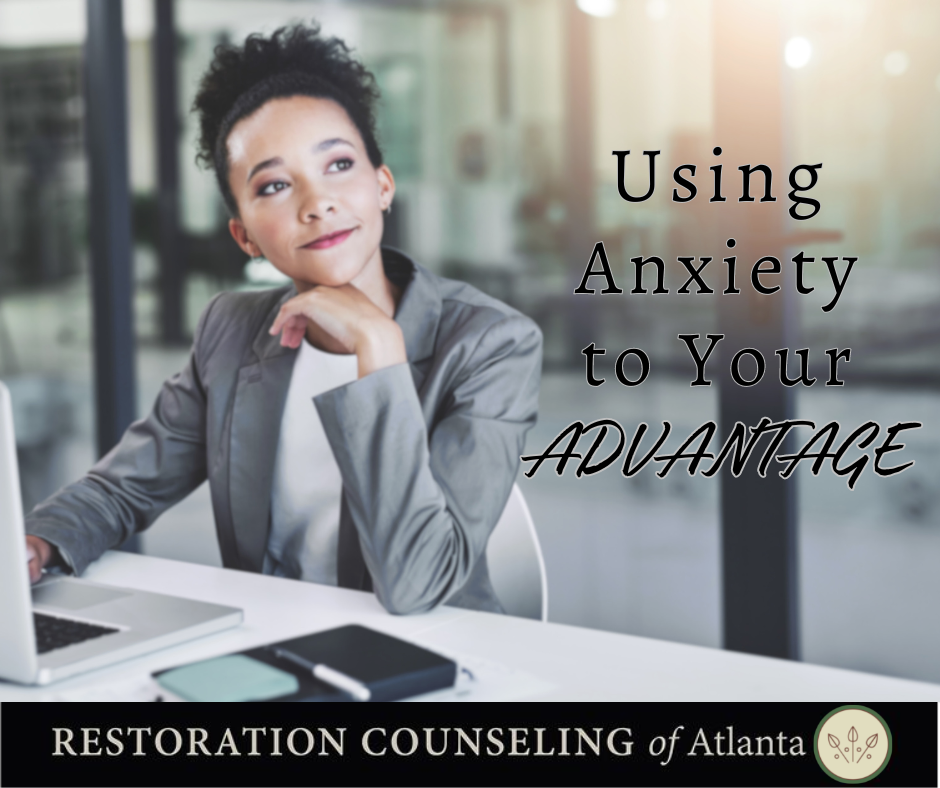Everyone experiences anxiety to some extent- it is a 100% normal part of the human emotional experience, albeit an uncomfortable part. So, given how uneasy anxiety makes us feel, it can be difficult to imagine it as helpful in any way.
But as psychologist Tracy Dennis-Tiwary (2022) wrote:
“Negative emotions like anxiety have long gotten a bad rap – irrational at best, destructive at worst… [W]e have actually come to understand that emotions like anger, fear, and anxiety are more advantageous than dangerous. Like the opposable thumb and language, emotions are tools for survival, forged and refined over hundreds of thousands of years of evolution to protect and ensure that humans can thrive. They do this by providing two things: information and preparation.”
While it is true that anxiety disorders can be debilitating and call for professional help, the widespread use of the term anxiety to mean general unease is problematic because “it means we accept two key fallacies: (a) experiencing anxiety is dangerous and destructive, and (b) the solution to its pain is to prevent or eradicate it. It is a way of thinking that has led us to perceive daily anxieties as malfunctions to fix” (Dennis-Tiwary, 2022).
Anxiety is not dangerous or destructive. It simply brings us information about the uncertain future: it tells us that something bad could happen, but something good could also happen. It is important to remember that all emotions, including anxiety, are just data for us to think about as we consider our response.
Anxiety vs. Fear
To be sure, anxiety isn’t information about definite and present threats – that is fear.
- Fear prepares us to fight, take flight, or freeze.
- Anxiety raises awareness about what is at stake.
Anxiety reminds us what is valuable and important to us and prepares us to persist, remain vigilant, and act in ways that avert disaster. It also can make positive possibilities into reality. It can surely lead to fear, sometimes appropriately and sometimes mistakenly. When in response to a real and present threat, it helps us survive by leading to action. So, if we eradicate or “fix” anxiety, we put ourselves in harm’s way.
When Anxiety Gets it Wrong
When anxiety mistakenly interprets our circumstances as dangerous, our bodies still experience the adrenaline rush of the fight/flight/freeze response. This feels uncomfortable and can lead to distorted thinking and avoidance of these triggering circumstances to not feel the negative emotional responses (fear, unease, discomfort, panic, etc.).
Anxiety is defined by avoidance. Yet every time we avoid an anxiety-producing situation, our anxiety grows stronger. The brain sees it like this: “When I avoid this situation, I feel better. I guess I should try to avoid it next time, too” (Pittman, 2015). That relief is short-lived and only reinforces our desire to avoid the situation. It is much healthier to recognize the feeling of anxiety as informational and use it as motivation to adapt to the circumstances.
No matter what the cause, listening to our anxiety – believing there is wisdom inherent in what it tells us and that we can use it to our advantage – is the very first step in learning to be anxious in the right way.
Ways to Use Anxiety
“Anxiety helps to boost our focus and drive as we close the gap between where we are now and where we want to be. That’s why anxiety contains hope – we can see future threats, but also have our eyes on the prize and believe that we can work to make good outcomes into reality. Finding useful information in anxiety prepares us to channel and direct our energies to work towards goals and pursue purpose. When we channel our anxiety towards pursuing and prioritizing purpose, that’s when it becomes courage. Anxiety fuels our momentum, unleashes our strength” (Dennis-TiWary, 2022).
Anxiety can cause restlessness and tense muscles, meaning the body is READY FOR ACTION. So use that to get moving! Get some exercise, play with the pets, start on a craft project, or write up a to-do list of everything your mind tells you is important.
Use anxious energy to face the difficult/uncomfortable thing that is at the root of anxiety, such as having (or at least making notes or rehearsing) a tough conversation.
Capture the creative thoughts as your mind races through ideas. It’s like unrequested brainstorming! Remember that anxiety makes us more creative and innovative and makes our brains respond with greater focus and efficiency when we face the unpredictable.
Anxiety also activates our drive for reward and social connection, urging us to work for what we care about, to connect with others, and to be more productive.
Recognize anxious moments as an opportunity to practice thought challenges for distorted thoughts (such as catastrophizing, all-or-nothing thinking, overgeneralization, personalization, etc.), particularly if you struggle with frequent worry.
Use it as a reminder to take care of your body and mind through mindfulness and relaxation practices, especially when it seems pointless. It is in these moments that we also build the emotional awareness and skills to work through – not around – our difficult emotions, and to seek support when we need it.
Conclusion
Knowing that the future is uncertain but that our actions can influence the outcome, choose to recognize anxiety as helpful to function in what otherwise might feel like a hopeless situation. It can be a tool to help us to cope with the challenges that life throws at us. In 1844, the Danish philosopher Soren Kierkegaard wrote: “Every human being must learn to be anxious in order that he might not perish either by never having been in anxiety or by succumbing in anxiety. Whosoever learns to be anxious in the right way has learned the ultimate.”
Anxiety is the messenger telling us that we are facing uncertainty and need to rise to the challenge. It points us to ways that our life needs to change or we need support. By delivering that message, it is our friend.

Written by Paige Santmyer, MA LPC NCC CCATP
Roswell location
paige@restorationcounselingatl.com, ext. 157
Paige provides counseling to adults ages 18+ experiencing anxiety, depression, relationship issues, parenting struggles, and life transitions. She uses a personalized approach of Client-Centered Therapy and Relational Psychoanalysis, as well as techniques from Cognitive Behavioral Therapy (CBT), Positive Psychology, and Exposure and Response Prevention (ERP). She has a certificate in both anxiety and trauma treatment.

